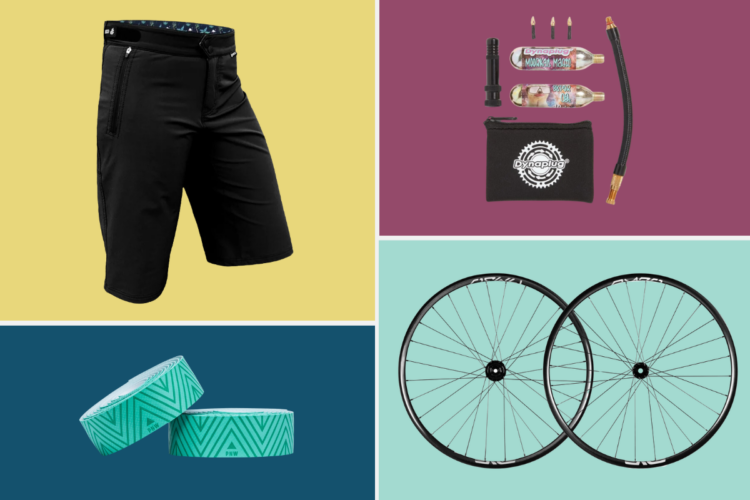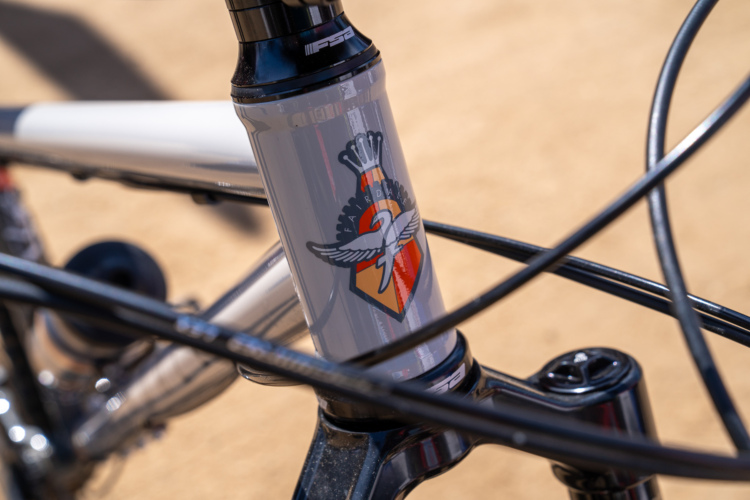Carbon wheels are one of the most sought-after upgrades for mountain bikers, but the price is often an issue. The distinction from an aluminum wheel set can be felt immediately after swapping to carbon, on the bike and in your wallet.
As the “you get what you pay for” anecdote often holds true, carbon wheels tend to be stiffer, more responsive, offer a more efficient rolling speed, and are lighter than aluminum. The caveat of course is that the cost is is often double, or even triple what someone can spend on a decent aluminum wheelset.
Over the years, prices on carbon wheelsets have dropped and they’re more attainable than ever. I got excited last year at Interbike when I saw that FSA had a new carbon wheelset that was less than $1,500 and wanted to see for myself how they’d stack up against other carbon wheels I’ve ridden, with the price in mind.
Specs

- Carbon, Boost-spaced wheelset in 27.5- or 29-inch diameter
- Hookless bead, tubeless-compatible, 24-spokes per wheel
- Asymmetric shape w/ 4mm offset, 30mm depth, 35mm EW, 29mm IW
- ISO 6-bolt rotor mount
- Six cartridge bearings
- 2-cross, double butted spokes w/ brass nipples
- 6-pawl aluminum for Shimano 9-11sp or SRAM XD 10-12sp freehub
- 6.6-degree engagement hubs w/ 54 points of engagement
- Two-year warranty
- Weight: R – 937g, F- 768g, 1,705g total
- Rim-only options: 24h, 28h, 32h for $475 w/ two-year warranty
- MSRP: $1,349 (check prices here)
About the Gradient WideR29
There are a few things worth noting when you check out the specs listed above. First of all, the weight difference is minimal (84g) compared to a more expensive carbon wheelset, like the ENVE M6s or a set of Chris King-equipped Santa Cruz Reserves by about 84g. That’s basically the weight of a few spokes.
The FSA Gradient wheelset is based off of a 24-spoke layout both front and rear. FSA says they can achieve the desired tension and stiffness with just 24 spokes, whereas a lot of other mountain bike rims use a 28 or 32 hole layout. For harder enduro or downhill riding, FSA recommends using a tire insert and/or dual casing tires.
FSA achieved their desired stiffness with an asymmetrical rim design also. An asymmetrical design offsets the spoke hole from the center of the rim and is said to allow better triangulation of the spokes and hub for better lateral stiffness in the wheel.
Lastly, there is one more point in the specs that we can notice where FSA is likely selling the rims at such a competitive price — or maybe it is in the lack of points. There are six degrees of rotation before engagement in the 6-pawl hubs and a total of 54 points of engagement. Premium hubs like Chris King have 72 points of engagement. The new Hydra hub by Industry 9 has just a half-degree of rotation before engagement.
While some may deem the Hydra excessive, the point is that it takes a little bit more design and machining time for a more premium hub. FSA appears to save a bit of money on the wheelset by using their hub which has fewer points of engagement and more degrees of rotation before engagement.
Riding the Gradient WideR 29
I’m happy to say that the Gradients have had some solid wheel testing in a variety of conditions and held to 100% the entire time. This includes a time when I flatted a tire on my backyard trail Apex and rode the remaining half-mile on a flat tire with a CushCore insert.
Apex is mostly fast and a bit technical with square-edge rocks on top of other square-edge rocks. This is basically where the Rocky Mountains start on the east side of the divide and where rock formations pushed into each other millions of years ago creating millions of other little rocks that push upward, jut toward the sky, and crack rims and sometimes humans without a care in the world.
My thoughts on riding the rest of the trail with a flat were: A. It’s more fun than walking, and B – This ought to be an honest test of the rim’s durability.
Now I didn’t World Cup DH into rock gardens or anything, but I probably kept a 5-10MPH rolling speed down the remaining trail. The CushCore insert most certainly helped against rim strikes, but only to a point.
It’s not always easy to tell, but the Gradient does feel like a different wheelset from the Race Face Next R wheels I had on my bike from a previous test. The Gradients feel a little less stiff than the Next Rs, which wasn’t a bad thing because that translates to a less harsh feeling.
For me, that’s an indication of a great carbon wheel. The idea with carbon is to stiffen the wheel for better rolling resistance and less flex, but not so much that it feels sketchy or too stiff when you’re riding through chunky rock gardens or landing off a drop.
As I noted above, the hubs feel a little on the lighter side compared to a Chris King or an Industry 9, and I’m really not a fan of cheap feeling hubs with a lack of engagement. I’d say that the FSA hubs are a few steps above the cheap, OEM hub category. The engagement feels better than I would have imagined and they have yet to feel slow or skip.
The other point folks will likely talk about is the two-year warranty on the Gradient WideR 29. For $250 more, the Santa Cruz Reserve wheels offer a lifetime warranty, which brings a huge peace of mind with carbon wheels. Other brands like Race Face have introduced their “no questions asked” two-year warranty, wherein they assure buyers they’ll replace a carbon wheelset within two years, even if they accidentally run it over with their car. While the warranty length is the same, it’s just an example of a company going the extra distance to ease consumers into considering a carbon wheel set that much more.
Final word
For $1,349, I’d say that the FSA Gradient WideR packs a punch. The carbon wheelset feels solid and durable, and sells for a few hundred dollars less than other sets. Sure, the rear hub lacks a little bit of engagement compared to others, but the wheels are also more affordable. For riders who want the rolling speed, responsiveness, and stiffness of carbon wheels without the full cost, the Gradient wheels are the ticket.
Thanks to FSA for providing the Gradient wheels for review.























